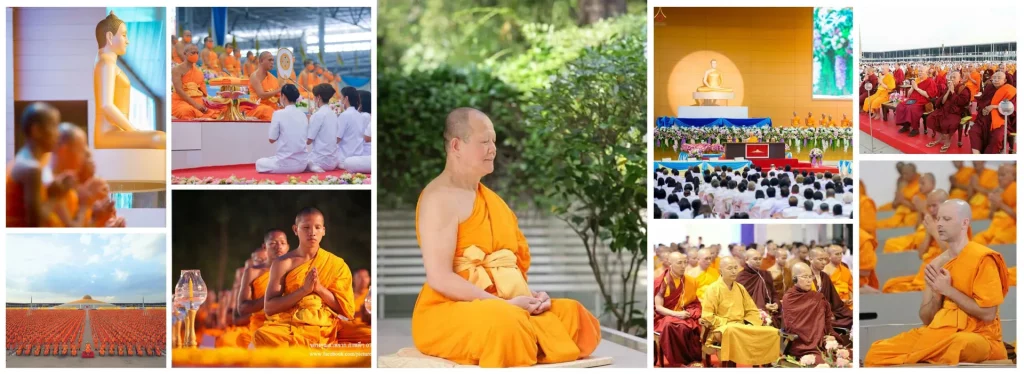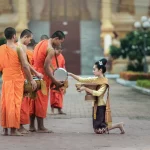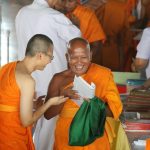
Who is a Buddhist Monk?
A Buddhist monk is person who takes a vow to practice religious asceticism by monastic living, either alone or with any number of other monks.
A Buddhist monk is called “Bhikkhu” in Pali, which is translated to “a person who sees danger in the cycle of birth and death”. A person who can be ordained as a monk must possess specific attributes and go through an ordination process in accordance to Buddhist disciplines (Vinaiya). For example, that person must be male and at least twenty years of age. He must not have serious or transmittable disease. The ordination must be endorsed by a preceptor monk and must be conducted in an ordination hall (Uposathāgāra).
Objectives of being a Buddhist Monk
- To train the mind.
- Study and practice precepts, meditation, and wisdom to purify one’s physical body, speech, and mind so that one does not harm oneself or others. The ultimate goal in monk’s life is to completely rid of all defilements and to attain Nibbana.
Life of a Buddhist Monk
The life of a Buddhist monk is simple. A monk’s cloth is composed of only three pieces of robes. A monk shaves his head to relieve himself from worldly burden and obsession with physical senses, which are touch, sight, hearing, smell, and taste. It also frees a monk from worrying about physical appearance and worldly life. It is a model life that requires less. We can compare the life of a Buddhist monk with a big tree that needs little water.
Furthermore, “a big tree” having a large network of branches can provide a cooling shade for others who seek refuge. A monk is a role model that trains oneself to be moral with wholesome manners. A monk possesses kindness and devotes himself to be a teacher who teaches morality and life’s wisdom to the people. Anyone who practices what monks teach will certainly see one’s life tremendously improved.
“A big tree that needs little water” means a monk can live his life with only four basic needs, which are offered and supported by faithful laypeople. He consumes just enough to live and do his duty and refrains from wastefulness.
Rules of conduct for Buddhist Monks
A Theravada Buddhist monk must keep 227 precepts. Precepts are rules that the Lord Buddha asks monks to follow for the peace and order of Sangha, the whole monastic community. They are basic practices that are beneficial to a monk’s celibate life. If a monk breaks a precept (an act of breaking a precept is called âpatti, he receives a different penalty according to the seriousness of the breaking. The most severe penalty is termination from a monkhood. A light penalty entails admitting the deed vocally with oneself or the other monks. The purpose of the act is to repent and resolve to improve one’s action.
Three main duties of a Buddhist monk
- Study the Dhamma, which is the teaching of the Lord Buddha. The goal is to fix bad habits and improve oneself in thinking, speaking, and doing and to become a role model for others in the society.
- Practice the Dhamma or practice the knowledge obtained during a study of Dhamma. This encompasses training oneself to be mindful.When focused, a mind has the power to suppress or rid oneself of defilements, which are greed, anger, and ignorance and can be enlightened to ultimately end suffering.
- Spread the Dhamma. A monk is a teacher who teaches morality for the people in the world. A monk dissuades people from performing unwholesome deeds and encourages them to perform wholesome deeds and cleanse their minds to attain true peace.
The study of the Dhamma can be compared to the study of the map. We study the map to see the roads to the destination. The practice of the Dhamma can be compared to following the route in the map to the desired destination. The spreading of the Dhamma can be compared to advising which routes to take so that people can reach their destination safely and speedily.
In conclusion, a monk is “one who sees danger in the cycle of birth and death” and who makes a life decision to be ordained in Buddhism. His life is guided by morality and supported by 4 basic needs from faithful lay people. His duty is to study the Dhamma, practice it to train and purify one’s action, speech, and mind, and to spread and teach the Dhamma. People who are on the receiving end of the teaching and practice the knowledge in their lives, will follow the righteous path toward the true goal of life and attain true peace. Furthermore, the peace will spread to people in our family, our friends, our neighbors in our community and in our country, and eventually the world.



